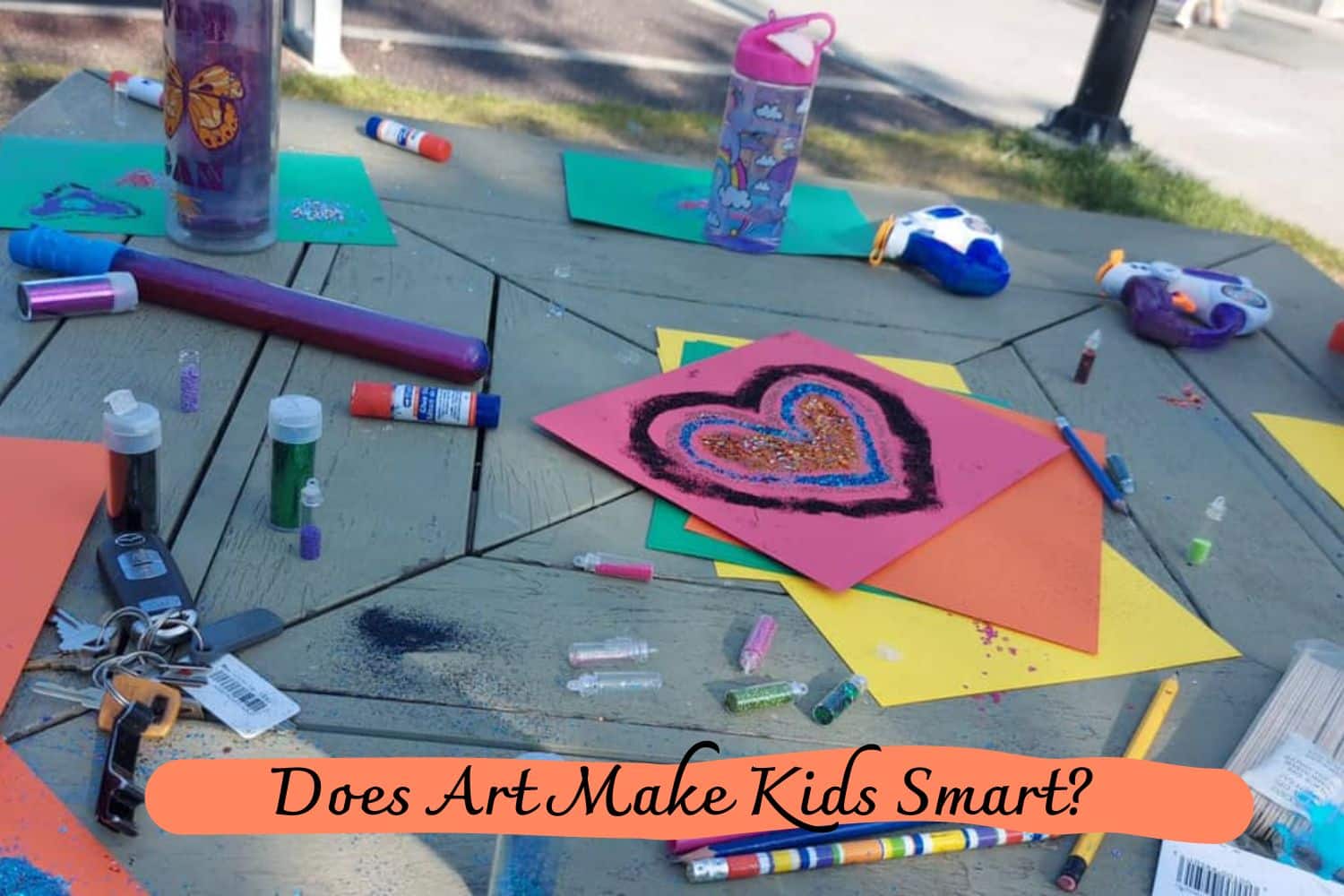Uncover the truth about – Does Art Make Kids Smart? We take a look at the impact art could have on your children, from improved problem-solving skills to developing creativity.
Does Art Make Kids Smart?

When it comes to raising brilliant children, parents often focus on bolstering academic’s skills and reading levels.
But what about the power of art? Does Art Make Kids Smart?
Discover the surprising benefits of artistic activities on children’s academic abilities. Engaging in simple arts activities, whether individually or in groups, such as singing, playing instruments, dancing, imaginative play, and visual arts, can enhance children’s proficiency in math, science, and literacy.
As it turns out, research has found that not only does art contribute to cognitive development in children—but art can also open up new pathways for creativity and knowledge! From creative problem-solving techniques to improved hand-eye coordination, explore how exposing our little ones to artistic pursuits could develop their cognitive potential.
Understanding the arts: Exploring the creative world of young children
Young children engage with the arts in four main areas:
- Dance: Moving to words, music, and rhythms, as well as various dance styles like ballet, jazz, modern, and more.
- Drama/Theatre: Using their imagination and engaging in make-believe play, incorporating puppets, creating characters, and acting out stories.
- Music: Singing, playing instruments, composing songs, and participating in rhythm games like clapping.
- Visual arts: Engaging in painting, drawing, sculpting, collage-making, printmaking, and crafts.
Every child uniquely possesses artistic abilities. Most children enjoy sharing and retelling stories, which serves as a stepping stone for dramatic play. Children naturally respond to music, whether it’s singing a beloved song during circle time, creating and playing homemade instruments, or exploring various genres. From early scribbles to more intricate artwork like finger painting, collages, clay, or sand sculptures, children embrace the opportunity to express themselves through messy art materials. As they navigate through space, very young children utilize their bodies to explore the world and convey emotions and thoughts through dance, from gentle swaying to joyous twirling and leaping.
How Does Art Make Kids Smart?
Discover the amazing ways the arts can enhance your child’s education while making it incredibly fun. With little to no cost, the arts can be seamlessly integrated into any routine or special occasion. Here are just a few of the academic benefits that come from incorporating the arts into your child’s day:
Math Made Easy: Engaging in visual arts activities helps children grasp patterns, shapes, and sizes, and even improves their ability to graph and understand spatial relationships. Dancing, singing, and playing instruments also develop pattern recognition and counting skills.
Science and Creativity Combined: Art adventures ignite curiosity, encouraging kids to make decisions, explore, experiment, and solve problems just like hands-on science does. Through the arts, children learn to take risks and nurture their innovative thinking.
Language and literacy skills: The arts provide countless opportunities to expand vocabulary, gain subject knowledge, and effectively communicate with others. Whether it’s creating skits or imaginative stories, performing, or presenting their work to an audience, children elevate their reading, speaking, writing, and vocabulary proficiency.
Social and emotional skills: The arts nurture essential lifelong skills such as collaboration, decision-making, and sharing among children. Additionally, it allows them to creatively express their emotions. By fostering a sense of community, collaborative art activities bring people together to create and perform, celebrating and appreciating diversity in the process.
Unleash the transformative power of the arts in your child’s education today!
How can you make a difference in children’s artistic experiences?
You don’t need to be an expert to help! Whether you’re a parent, grandparent, aunt, uncle, cousin, or friend, here are some easy and affordable ways to support children’s artistic growth:
- Spark creativity with storytelling. Dress up in homemade costumes, use props, and draw pictures together to bring stories to life. Create your storybook!
- Add beauty to your community. Transform a park, a blank wall, or an ugly appliance with children’s drawings, collages, or murals. Get your friends and neighbors involved!
- Dive into music. Listen to various genres, feel the beat, and have a dance party! Enhance the experience with scarves or wands. Draw how music makes you feel, and sing your favorite songs together.
- Explore local arts and culture. Visit museums, attend local art exhibits, or enjoy concerts. Look for free passes and events in your area, both at the library and online.
- Immerse in art through books. Read books about art or artists and discuss the artwork and inspiration behind them. Foster children’s self-identity as artists and celebrate their creativity.
Remember, the most important thing is to have fun, no matter what activities you choose!
Conclusion
After taking a closer look at the debate of whether art makes kids smarter, it is clear that art has the potential to positively impact a child’s learning. Art can drive creativity and help children develop critical thinking and problem-solving skills as they get older.
Furthermore, art classes offer a great opportunity to nurture students’ natural creative abilities in a positive environment with like-minded peers. While research suggests there is evidence that art contributes to higher academic achievement, further studies on the specific impacts of participating in different types of art activities are needed.
Regardless, we must continue to explore ways to maximize our student’s academic success, and embracing art should certainly be part of that discussion.
No matter how you view it – making art or engaging in classroom discussions about the works created by masters – one thing remains clear: Art allows us all the freedom to ignite powerful emotions and ultimately become more intelligent through creative and inspiring means.
Thanks for reading our article Does Art Make Kids Smart? If you want to know more information, visit our website here.
Read more:
